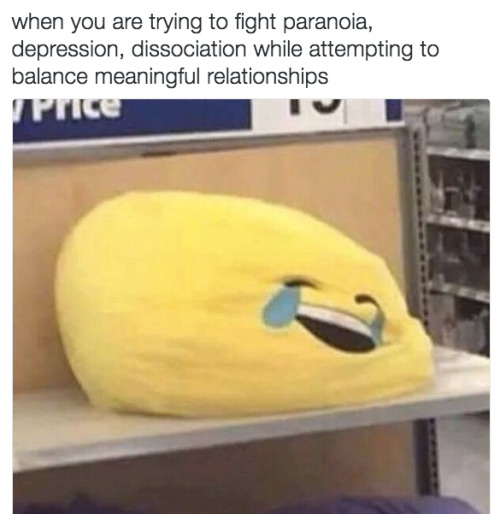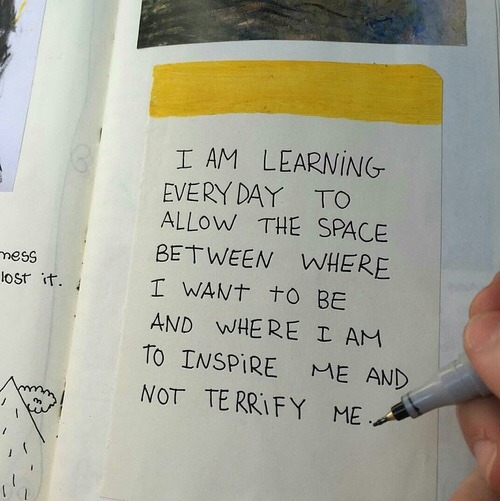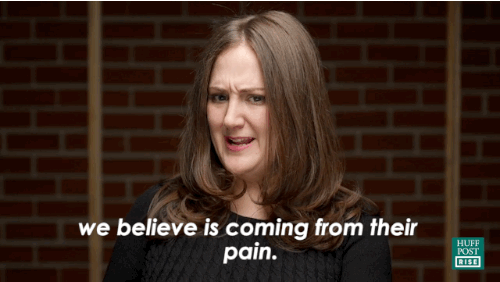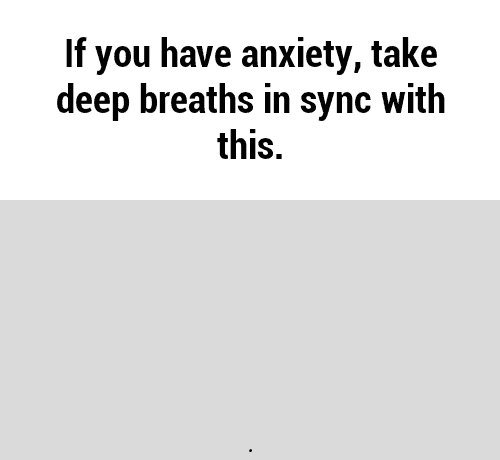So This Happens. Particularly Zoning Out, And It Seems More Intense Now That I've Been On Medication.
So this happens. Particularly zoning out, and it seems more intense now that I've been on medication. Sustaining concentration on anything is difficult.
I tend to crochet to keep myself grounded. But even then, I'll become enamored with the texture or my progress and I'll stop and dissociate. Even writing this reblog was more difficult than it should have been.
Are You Dissociating?
Dissociating is one of the most common responses to abuse and trauma. It involves feeling numb, detached or unreal and (while it happens to everyone once in a while) is experienced more frequently and severely in survivors. Dissociating people vary widely in symptoms and may experience any or all of the things from the following list.
You may be dissociating if you:
find yourself staring at one spot, not thinking anything
feel completely numb
feel like you’re not really in your body, like you’re watching yourself in a movie.
feel suddenly lightheaded or dizzy
lose the plot of the show or conversation you were focused on
feel as if you’re not quite real, like you’re in a dream
feel like you’re floating
suddenly feel like you’re not a part of the world around you
feel detached and far away from other people, who may seem mechanical or unreal to you
are very startled when someone/something gets your attention
completely forget what you were thinking just a moment ago
suddenly cover your face or react as if you’re about to be hurt for no reason
can’t remember important information about yourself, like your age or where you live
find yourself rocking back and forth
become very focused on a small or trivial object or event
find that voices, sounds or writing seem far away and you sometimes have trouble understanding them.
feel as if you’ve just experienced a flashback (perhaps rapidly) but you can’t remember anything about it.
perceive your body as foreign or not belonging to you
(likes and reblogs always taken as support)
More Posts from Sordidsass-blog and Others
Extreme Science: Launching Sounding Rockets from The Arctic
This winter, our scientists and engineers traveled to the world’s northernmost civilian town to launch rockets equipped with cutting-edge scientific instruments.

This is the beginning of a 14-month-long campaign to study a particular region of Earth’s magnetic field — which means launching near the poles. What’s it like to launch a science rocket in these extreme conditions?

Our planet is protected by a natural magnetic field that deflects most of the particles that flow out from the Sun — the solar wind — away from our atmosphere. But near the north and south poles, two oddities in Earth’s magnetic field funnel these solar particles directly into our atmosphere. These regions are the polar cusps, and it turns out they’re the ideal spot for studying how our atmosphere interacts with space.

The scientists of the Grand Challenge Initiative — Cusp are using sounding rockets to do their research. Sounding rockets are suborbital rockets that launch to a few hundred miles in altitude, spending a few minutes in space before falling back to Earth. That means sounding rockets can carry sensitive instruments above our atmosphere to study the Sun, other stars and even distant galaxies.
They also fly directly through some of the most interesting regions of Earth’s atmosphere, and that’s what scientists are taking advantage of for their Grand Challenge experiments.

One of the ideal rocket ranges for cusp science is in Ny-Ålesund, Svalbard, off the coast of Norway and within the Arctic circle. Because of its far northward position, each morning Svalbard passes directly under Earth’s magnetic cusp.
But launching in this extreme, remote environment puts another set of challenges on the mission teams. These launches need to happen during the winter, when Svalbard experiences 24/7 darkness because of Earth’s axial tilt. The launch teams can go months without seeing the Sun.

Like for all rocket launches, the science teams have to wait for the right weather conditions to launch. Because they’re studying upper atmospheric processes, some of these teams also have to wait for other science conditions, like active auroras. Auroras are created when charged particles collide with Earth’s atmosphere — often triggered by solar storms or changes in the solar wind — and they’re related to many of the upper-atmospheric processes that scientists want to study near the magnetic cusp.

But even before launch, the extreme conditions make launching rockets a tricky business — it’s so cold that the rockets must be encased in styrofoam before launch to protect them from the low temperatures and potential precipitation.

When all is finally ready, an alarm sounds throughout the town of Ny-Ålesund to alert residents to the impending launch. And then it’s up, up and away! This photo shows the launch of the twin VISIONS-2 sounding rockets on Dec. 7, 2018 from Ny-Ålesund.

These rockets are designed to break up during flight — so after launch comes clean-up. The launch teams track where debris lands so that they can retrieve the pieces later.

The next launch of the Grand Challenge Initiative is AZURE, launching from Andøya Space Center in Norway in April 2019.
For even more about what it’s like to launch science rockets in extreme conditions, check out one scientist’s notes from the field: https://go.nasa.gov/2QzyjR4

For updates on the Grand Challenge Initiative and other sounding rocket flights, visit nasa.gov/soundingrockets or follow along with NASA Wallops and NASA heliophysics on Twitter and Facebook.
@NASA_Wallops | NASA’s Wallops Flight Facility | @NASASun | NASA Sun Science
WARNING to anyone planning on LEAVING THEIR HOUSE
The outside has unfriendly people, as well as a gigantic ball of fire in the sky. In addition, you may sometimes encounter a bird or an unpleasant smell.
Posting this because THERE ARE NO POSTED WARNINGS when exiting your home.
SIGNAL BOOST THE HELL OUT OF THIS.


To my Black and Brown fam, please stay safe.
Stay indoors.
The worse has happened and that man was elected. White supremacy will rear the ugliest of heads in the coming days. They will be hunting. Check in with your loved ones. This is not a drill.
We will rally again. But now is not the time.
Stay home. Stay safe.










This Comedian Nails Why The Mental Illness + Creativity Connection is Ridiculous

For those with anxiety.
Veteran's Day
Happy veteran's day to those who protected rights I will never have nor fully enjoy.
i don’t know how to explain what it feels like to run and look behind and see nobody coming after you.
inkskinned (via apathyrevisited)
-
 stersartblog liked this · 2 weeks ago
stersartblog liked this · 2 weeks ago -
 lavender3ds liked this · 2 weeks ago
lavender3ds liked this · 2 weeks ago -
 thy-dragon reblogged this · 3 weeks ago
thy-dragon reblogged this · 3 weeks ago -
 thy-dragon liked this · 3 weeks ago
thy-dragon liked this · 3 weeks ago -
 vr1sk4myd4rl1ng liked this · 3 weeks ago
vr1sk4myd4rl1ng liked this · 3 weeks ago -
 wall2468 reblogged this · 3 weeks ago
wall2468 reblogged this · 3 weeks ago -
 edettethegreat liked this · 3 weeks ago
edettethegreat liked this · 3 weeks ago -
 concupiscentlyashen-blog reblogged this · 3 weeks ago
concupiscentlyashen-blog reblogged this · 3 weeks ago -
 durgenjay liked this · 4 weeks ago
durgenjay liked this · 4 weeks ago -
 jade-dragon555 liked this · 4 weeks ago
jade-dragon555 liked this · 4 weeks ago -
 werestillclover liked this · 1 month ago
werestillclover liked this · 1 month ago -
 pure-failure reblogged this · 1 month ago
pure-failure reblogged this · 1 month ago -
 kirra-qween115 reblogged this · 1 month ago
kirra-qween115 reblogged this · 1 month ago -
 kirra-qween115 liked this · 1 month ago
kirra-qween115 liked this · 1 month ago -
 manystarbiters reblogged this · 1 month ago
manystarbiters reblogged this · 1 month ago -
 juusou liked this · 1 month ago
juusou liked this · 1 month ago -
 onlyacisdealsinabsolutes liked this · 1 month ago
onlyacisdealsinabsolutes liked this · 1 month ago -
 goddessorbutch liked this · 1 month ago
goddessorbutch liked this · 1 month ago -
 intergalaticfantastic reblogged this · 1 month ago
intergalaticfantastic reblogged this · 1 month ago -
 itzlunexoxo liked this · 1 month ago
itzlunexoxo liked this · 1 month ago -
 stilllivinginthesewers reblogged this · 1 month ago
stilllivinginthesewers reblogged this · 1 month ago -
 stilllivinginthesewers liked this · 1 month ago
stilllivinginthesewers liked this · 1 month ago -
 amusedbird liked this · 1 month ago
amusedbird liked this · 1 month ago -
 nararagle liked this · 1 month ago
nararagle liked this · 1 month ago -
 mostlynotaguy liked this · 1 month ago
mostlynotaguy liked this · 1 month ago -
 knottedflowers liked this · 1 month ago
knottedflowers liked this · 1 month ago -
 june-yaps liked this · 1 month ago
june-yaps liked this · 1 month ago -
 sillylilytransfem reblogged this · 1 month ago
sillylilytransfem reblogged this · 1 month ago -
 sillylilytransfem liked this · 1 month ago
sillylilytransfem liked this · 1 month ago -
 crazed-transbian-lunatic liked this · 1 month ago
crazed-transbian-lunatic liked this · 1 month ago -
 crazed-transbian-lunatic reblogged this · 1 month ago
crazed-transbian-lunatic reblogged this · 1 month ago -
 robotmechagirl liked this · 1 month ago
robotmechagirl liked this · 1 month ago -
 valdis-kobold reblogged this · 1 month ago
valdis-kobold reblogged this · 1 month ago -
 robotmechagirl reblogged this · 1 month ago
robotmechagirl reblogged this · 1 month ago -
 levi-leviathan reblogged this · 1 month ago
levi-leviathan reblogged this · 1 month ago -
 spaghettihellspersonalangel reblogged this · 1 month ago
spaghettihellspersonalangel reblogged this · 1 month ago -
 charliedrawsbiteof87 reblogged this · 1 month ago
charliedrawsbiteof87 reblogged this · 1 month ago -
 charliedrawsbiteof87 liked this · 1 month ago
charliedrawsbiteof87 liked this · 1 month ago -
 sevensden liked this · 1 month ago
sevensden liked this · 1 month ago -
 avery3641 liked this · 1 month ago
avery3641 liked this · 1 month ago -
 idknotimportant liked this · 1 month ago
idknotimportant liked this · 1 month ago -
 vivian-the-panda liked this · 1 month ago
vivian-the-panda liked this · 1 month ago -
 thesillytransgirlnova liked this · 1 month ago
thesillytransgirlnova liked this · 1 month ago -
 c0nstantlyscreaming liked this · 1 month ago
c0nstantlyscreaming liked this · 1 month ago
Struggling with mental illness after a traumatic event most likely caused by mental illness. Sexual Assault Survivor.
282 posts